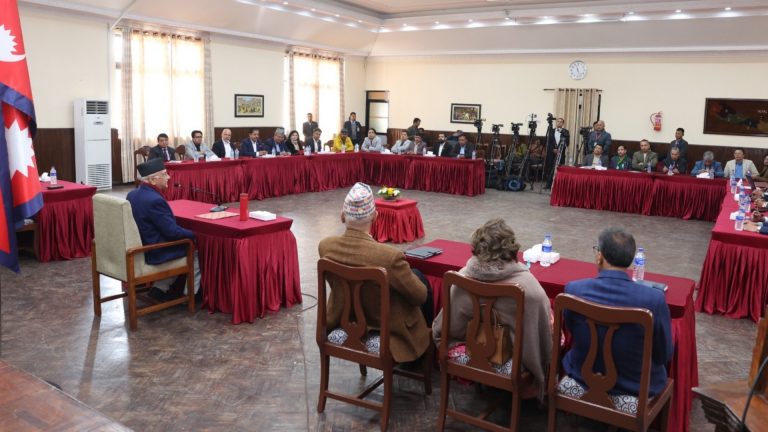The new central bank Governor Dr Biswo Nath Poudel has rolled out his first monetary policy on Friday taking a cautious monetary easing stance—a continuation of two previous policies of his predecessors. The flexible policy comes in response to weak economic activity and growing liquidity in the economy, which means it plans to increase the money supply and reduce interest rates.
The monetary policy is designed to back the government’s 6% growth target by boosting private sector credit by 12% and expanding the broad money supply by 13%. At the same time, the central bank aims to maintain macroeconomic stability by keeping inflation within 5% and ensuring foreign exchange reserves remain adequate to cover seven months of imports.
To do so, it has adjusted its monetary instruments. The new policy has narrowed the interest rate corridor to 6% (upper bound) and 2.75% (lower bound) from the previous 6% and 3%, respectively. The lower bound of the corridor implies deposit collection rate. It has also lowered the policy rate to 4.5% from the existing 5%.
The policy has left the cash reserve requirement and standard liquidity ratio untouched, but the overall policy maintains an accommodative stance. In his speech aired on YouTube, he noted that the policy is aimed at stimulating demand and preventing deposit rates from turning negative in real terms.
Other key announcements:
Home and share-backed loans:
→ The maximum limit on home loans has been raised to Rs 30 million, with an interest rate cap of base rate +2%, boosting affordability for housing amid subdued real estate activity. The updated home loan limit covers loans for building or buying private residences. First-time buyers can still borrow up to 80% of the property’s value, while the loan-to-value ratio for all other borrowers remains at 70%.
→ The limit for share mortgage loans has been increased to Rs 250 million, up from Rs 150 million, expected to inject fresh liquidity into the stock market. These increments in the cap are also expected to create bubbles in the respective markets.
Easing foreign exchange for travellers:
→ Outbound Nepali travellers will now be able to avail foreign exchange limit up to $3,000, increased from $2,500
Small and agricultural borrowers:
→ A new outreach program titled “NRB with Borrowers” will be launched in rural areas to ensure grassroots engagement and address credit concerns.
→ Banks and financial institutions can independently assess collateral value and issue agricultural or business loans up to NRs one million. They can evaluate the value of crops, cultivable land, and farm-related infrastructure themselves when issuing loans. A minimum loan loss provisioning requirement will be applied only after the grace period for such loans, making them more financially viable for both banks and borrowers.
The central bank has also pledged to streamline and diversify agricultural lending, allowing for a broader range of loan terms and structures aligned with the nature of the crops or livestock involved. This includes loans for food grain production, crop cultivation, livestock farming, and aquaculture.
Digital and structural reforms:
→ Commercial banks will now be classified based on capital adequacy, NPLs, governance, and risk, with top performers eligible for self-regulation privileges.
→ Banks and financial institutions are allowed to raise their capital as needed, subject to Nepal Rastra Bank’s approval.
→ Foreign joint venture banks will be allowed to offer retail banking, ending a 15-year suspension on new commercial licenses.
→ A national-level KYC system will be introduced, enabling data sharing across banks through National ID integration, reducing paperwork and improving access to services.
→ NRB will promote Neo Banks to expand digital financial services and AMCs to manage non-performing assets, aligning with budget announcements.
Foreign Exchange and investment liberalization:
→ The primary capital requirement for non-deliverable forward (NDF) transactions has been raised from 20% to 25%, enhancing currency risk coverage.
→ Foreign investors will now be able to hedge forex risks through commercial banks.
→ The Foreign Investment and Foreign Loan Management Regulations, 2078 will be revised to ease repatriation of capital, dividends, and interest by foreign investors.
→ The convertible currency list will be expanded to include Bangladeshi Taka and Sri Lankan Rupee, reflecting growing regional trade ties.
→ The Foreign Exchange Dealers’ Association of Nepal (FEDAN) rate for remittance exchange mechanism and interbank forex policy will be reviewed to align with international practices.





